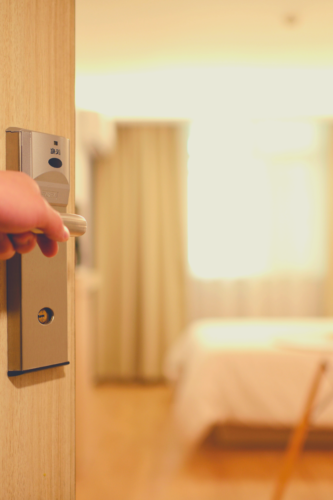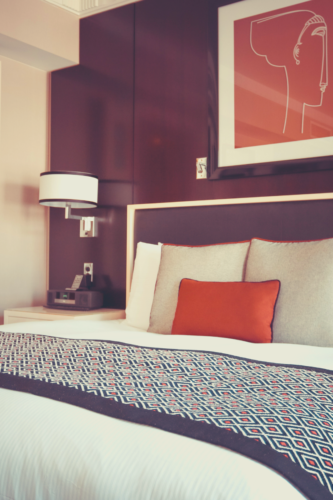Airbnb vs renting: Airbnb puts the power of additional income in the palm of your hand. When it comes to your property, which is the real money maker?
It doesn’t take too many trips around the monopoly board to learn that real estate is one of the best ways to invest your money. Not only can the value of your property appreciate through inflation and growth in the area, but there is always the option to put in some sweat equity to get some money in the bank.
While the property is generally seen as a good long-term investment, the last decade has seen a rise in the popularity of short-term rentals. Instead of relying on traditional rental models to bring in cash-flow, many of today’s investors are seeing an even larger return on a shorter stay.
But are these short-term rentals the right way to make money with your property? The Budget Diet takes a closer look at the pros and cons of Airbnb vs renting.

History of Airbnb
It’s hard to believe it’s only been just over a decade since Airbnb was formed in 2007. The idea came to founders Brian Chesky and Joe Gebbia after they found themselves struggling financially after a move from New York to San Francisco. The two decided that a lack of available hotel rooms in the city partnered with a convention in town allowed them an opportunity to provide a ‘bed and breakfast’ service in their home. The two bought some air mattresses for their guests which led to the phrase ‘air’ bnb.
While the success of Airbnb slowly grew, more and more people around the world discovered a way to share their properties. Other found a new way to travel and stay in new cities in an affordable way. Airbnb currently has over six million listings in over 191,000 countries. The company is rumored to be worth over $25 billion.
How Do Short-term Rentals Affect the Housing Market?
While the ability to generate short-term income through their property may be appealing to homeowners, it could have a devastating effect on home ownership and the real estate industry. According to a study by Harvard University, almost 40 million Americans live in housing they cannot afford. Rental costs are increasing while homeownership is on the decline.
Many are saying that short-term rentals have a hand in this trend.
According to a 2018 study, which examined the correlation between the housing market and Airbnbs, the increased ability to make an income from sharing your home as a short term rental has led to an increase in both rent and housing prices.
This increase comes from both landlords choosing to use their properties as short term rentals rather than traditional rental agreements and a perceived increase in value from a home that can generate additional income.
Not all areas are happy about the increase in short term rentals. Many policymakers are concerned that landlords may wish to evict their tenants in favor of the increased revenue available from short-term rentals. There are also concerns about adhering to zoning bylaws and security and noise issues that could arise from a residential area catering to tourists.

It is with those concerns in mind that many cities began imposing large fines for those operating short-term rentals. Paris is one of the latest cities to see a crackdown on short-term rentals. The French capital is Airbnb’s largest market with an estimated 60,000 homes on offer. Officials are calling for regulation as the short-term rental market may force many locals out of the city center as rental prices increase beyond affordability. Many other areas across the globe have raised similar concerns including New York, New Orleans, Spain, Amsterdam, and Edinburgh.
What to Consider Before Purchasing a Property
While many property owners are ready to jump on the short-term rental bandwagon to secure some extra rental income, it is important to do your due diligence first.
Look into the local by-laws and zoning requirements in your area to determine if there are any restrictions on short-term rentals. For example, in some areas, there is a minimum amount of time a renter must stay in a home and others require that the owner occupy the property for a minimum amount of time each year.
If you belong to a homeowner’s association, they may have rules against using your property as a short-term rental. It may also be in violation of your mortgage company’s rules. You will also want to check out how this type of investment may impact your homeowner’s insurance and property taxes.
Owner Occupier or Absent Landlord

There is a popular option for those who want to dip their toe into the rental market rather than dive right in-rent a room. Renting out a room in a property that you reside in will allow you to make income from unused space without much additional investment. By living in the home alongside your guest you are able to monitor the way your home is being treated.
On the flip side, living with your guests means sharing your home and your personal space. A guest may feel less comfortable in your space because of a lack of privacy and it could result in a shorter visit or a negative review.
Your guest may also expect more hospitality perks in this type of setting, such as meals or turndown service. This nightly visitor may be more work than you bargained for.
Not to mention that you are putting your safety into the hands of an app. While your nightly visitor may have good ratings from previous visits, they could also be dangerous. You are inviting a stranger into your home while you sleep.
It could result in a creepy encounter and some sleepless nights.
Roommate vs. Guest

Having a guest for a night or two may seem like an ideal way to bring in some extra cash, but it is not often a steady rental income that can be counted on. Renting a room on a monthly or longer-term basis often results in both a steady income and a more comfortable living arrangement. By offering a long-term rental, you are able to complete background and security checks, determine compatibility and develop a friendship. Many would consider this a safer option than welcoming a stranger into their home for the night.
Of course, once you have signed a rental agreement to share your home, it can be tricky to evict a bad roommate. Annoying short-term guests have a check-out date, but long term renters could require a lease agreement, court dates and lawyers to leave your home.
Make Yourself at Home
Those who choose not to live with their guests may do so because the property was purchased as an investment or may have jobs that require them to travel often. This type of short-term rental may feel more comfortable for both you and your guests but can leave you vulnerable to theft or damage.
With short-term rentals, anyone with the Airbnb app can book your home for the night. There is no security check required and while some locations have restrictions on the number of guests and whether or not there are noise restrictions, these are not things that can easily be enforced remotely.
Airbnb Host Guarantee

Airbnb offers each property listed a host guarantee of up to $1 million USD for any property damage. While this sounds like the perfect protection, it does come with many limits. For example, while this protection is in place, there are limitations including ‘normal wear and tear’ damage that occurs in common areas of the building as well as limited protection on jewelry, artwork, and collections. Oh yeah, and damage caused by pets is also not covered.
Should You Ask for a Security Deposit?
With these points in consideration, many short-term rentals may ask for a security deposit to put their minds at ease. While a security deposit may seem commonplace in many long-term rental markets and in a standard lease agreement, this additional potential expense could turn off a potential guest, especially in a saturated market.

Those who are purchasing a property specifically to be a short-term rental can choose to outfit it in economical furniture and decor, but those who live in their property at least part-time may not be willing to change their decor to suit their short-term guests.
Do you want to decorate on a budget? Check out 10 DIYs to decorate on a budget.
Location, Location, Location
When it comes to real estate, the first rule is always: location, location, location. This is especially true when it comes to short-term rentals. Many budget-conscious travelers look to short term rentals to ease their accommodation costs. With this in mind, those booking a short-term rental are going to consider things like:
- Access to public transit
- Proximity to the airport/train station
- What type of attractions are within walking distance?
- Are their quality restaurants in your area?
- What is the nightlife like in the area?
- How safe is the area?
The location of your property will not only help set your rates but can also help determine your occupancy rate. This is an important financial consideration. A home on the beach may bring in a great price during the summer season, but will then stay empty most of the year.

A great location can also attract a long-term rental, without the worry of loss of income in the low season. It is also important to remember that touristy areas often also offer fierce competition from other properties as well as potential city regulations that discourage short-term rentals.
Check out 7 ways you can use your home to earn
Fierce Competition
While many areas offer a low vacancy rate for long-term rentals, short term rentals like Airbnb often offer up some stiff competition. In order to stand out from the crowd a get a booking, many hosts have to go above and beyond.
This can mean professional photos to stand above the crowd. Perhaps your listing offers extras such as curated lists of local hot spots or a welcome basket of treats? In order to have your listing attract more buyers, it may cost you time and money.
How Much Work do You Want to do?
Short term rentals may offer a higher rate of return, but they can also mean a lot more work. Depending on the length of stay you may find yourself regularly finding time in your schedule to meet new guests to welcome them into your home or give out keys.

A constant turnover also requires constant laundry and cleaning as well as replenishing of toiletries and other amenities such as coffee, tea, or any other extras you may offer guests.
Longer term rentals may lend themselves to hiring a property management team, but short-term rental responsibilities often fall on the property owner.
How do You Rate?
Traditional rentals often operate by word of mouth alone. Potential tenants are not able to wade through feedback left by former residents to learn how you add up as a landlord. Often their decision to rent from you is based on location and the property itself.
Airbnb works on a rating system for both guests and their hosts. This is a way to ensure that both hosts and guests are able to check out the feedback. A bad rating could literally cost you in lost bookings. Guests with a bad reputation may also find themselves left out in the cold. One bad booking could cost you your reputation.
With longer term rentals you are able to use a much more traditional screening process such as a criminal reference and credit check to determine your tenant’s suitability.
Utility Costs
Utilities are an area where longer term rentals have a definite advantage. In long term rentals, the utilities can be put in the renter’s name and become their responsibility. While the landlord is responsible for property taxes, homeowner fees (if applicable) and house insurance, the tenant is usually responsible for paying all other costs associated with the property.
With traditional rentals, the tenants are responsible for the utility costs, and therefore any overuse or misuse is their responsibility. With Airbnb, any utility cost must be worked into your booking fee. So, whether your tenant wants to crank up the heat with the windows open or take steaming hot showers over and over, you are responsible for the bill.

You are not only footing the bill for the necessities. Many short-term tenants consider high-speed internet and premium cable packages a necessity. These are additional costs you will be responsible for each month.
Pets
Pets can be a dealbreaker for many property owners. Concerns can arise from potential property damage, health concerns and how the animal could affect the neighbors around the property.
According to Rent.com, even in pet-friendly buildings, tenants can be evicted if their pet proves to be a nuisance. Many landlords can charge an additional fee for pets each month or an additional damage deposit. In addition to eviction from failure to pay rent, you can also be evicted for failing to pay your pet fees.

In contrast, Airbnb hosts are able to decide whether they will or will not accept pets, but there is essentially almost no way to ensure furry friends are prohibited from entering your property. Furthermore, damage from pets is not included in the host guarantee. So if a four-legged friend ruined your brand new couch, you are responsible for the replacement cost.
Our Verdict
Investing in property is a sound long-term financial investment. That means that while dips in housing prices and changing interest rates can affect the cost and value of your investment in the short-term, in the long-term your property is likely to increase in value and price bringing you a positive return.
Many people buy investment properties with the intention to let others pay their mortgage. This can be a sound financial decision in a good rental market. This can be a good way to afford to carry another property while you are waiting for your investment in an increase in value.
Purchasing an investment property is generally considered to be a sound long term investment. One question that you need to ask yourself is how much of a financial risk you are able to take.
Airbnb is a relatively newer service and investing in a property primarily for a short-term rental can carry additional risk. For example, current or future government restrictions on short term rentals could affect your potential profit. A saturated market or downturn in interest could also limit your return as well as a bad review.
In closing, there's a lot to consider when evaluating Airbnb vs renting. Airbnb offers property owners the ability to make additional income while travelers benefit from affordable accommodation. Knowing which type of rental is best for your investment will depend heavily on your location, amenities, and market.
Are you still considering what property type is best for you and your family? Check out our guide to determining the best property type for frugal families!


